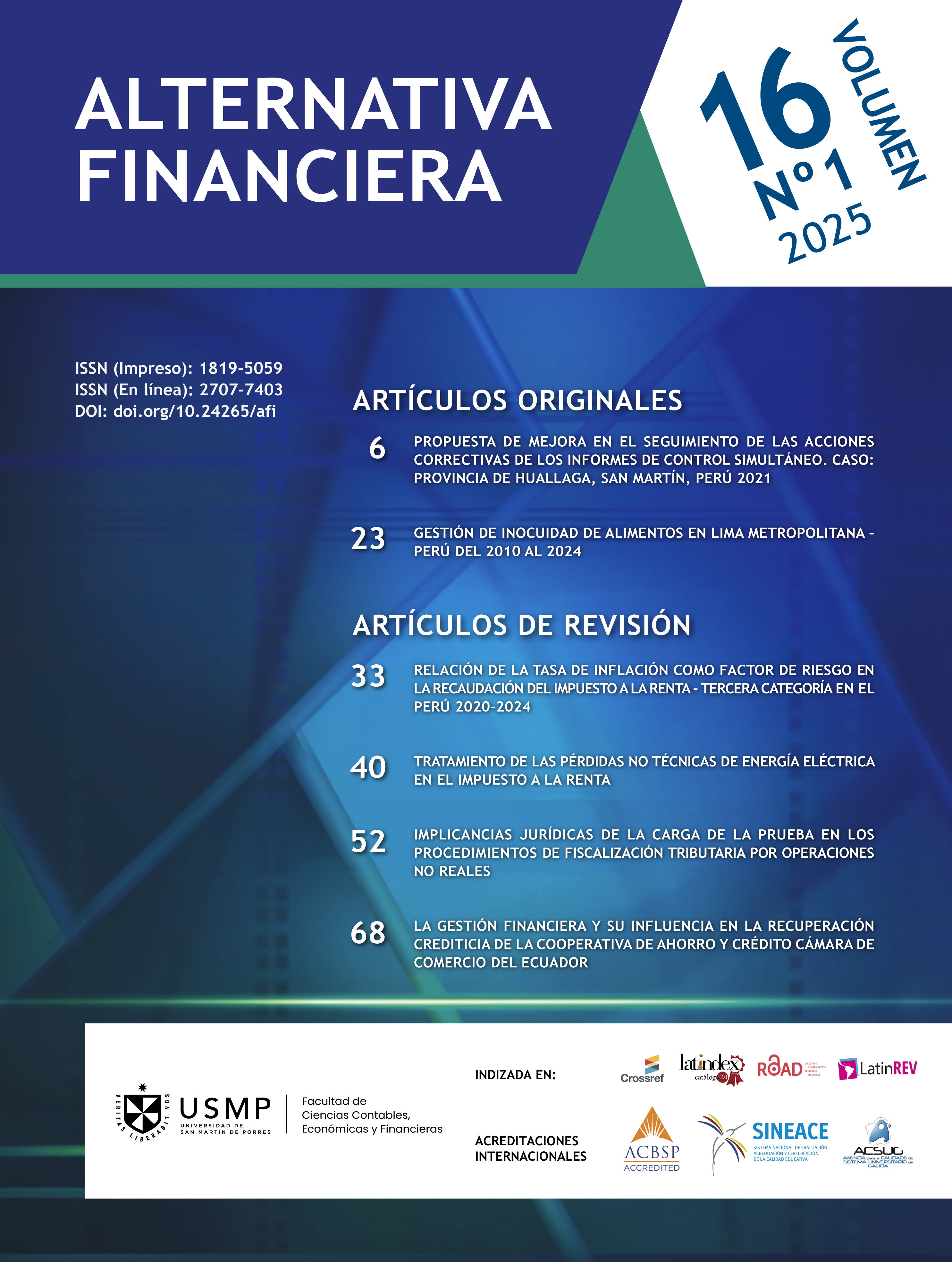TREATMENT OF NON-TECHNICAL ELECTRICAL ENERGY LOSSES IN INCOME TAX
DOI:
https://doi.org/10.24265/afi.2025.v16n1.04Keywords:
pérdidas no técnicas, impuesto a la renta, sector eléctrico, normativa fiscalAbstract
Non-technical energy losses impact the profitability of electric utilities and the stability of the energy market; these losses resulting from fraud, illegal connections and administrative errors create regulatory and tax challenges. This study examines the income tax treatment in Peru, Brazil, Colombia and Chile using a qualitative approach based on normative, jurisprudential and doctrinal analysis, along with a comparative review of each country’s tax regulations.
The results highlight significant discrepancies with respect to the deductibility of such losses. In Peru, a judicial procedure is required for these losses to be recognized for tax purposes. This leads to legal uncertainty and increases the burden of proof. In Brazil, ANEEL allows some losses to be carried forward to the electricity tariff, but their tax deductibility is subject to specific regulations. Colombia and Chile adopt a more flexible approach, allowing deduction through technical audits and regulatory certifications without requiring a court ruling.
The study concludes that the absence of tax harmonization affects the competitiveness of the sector and discourages investment in technologies to mitigate electricity fraud. It is suggested to implement homogeneous criteria for their deduction, prioritizing technical audits and precise regulations, instead of judicial requirements that are complex to comply with. A more balanced regulatory framework would facilitate the reduction of these losses without jeopardizing the financial sustainability of the electricity sector.
Keywords: Non-technical losses, income tax, electricity sector, tax regulations.
Downloads
References
Chevarría Izarra Mario Fernando. (2017). Tratamiento tributario de las pérdidas de energía eléctrica: técnicas y no técnicas. https://doi.org/http://doi.org/10.26439/ulima.tesis/9557
Circular 3, Pub. L. No. Circular 3 (1992). https://bcn.cl/3l109
Circular N°23, Pub. L. No. Circular N°23 (2010). https://bcn.cl/3r16a
De Oliveira, L., Melo, J., Padilha, A., Fernández, J., Sánchez, C., & Piedrahita, C. (2020). A new way for comparing solutions to non-technical electricity losses in South America. Utilities Policy, 67. https://doi.org/10.1016/j.jup.2020.101113
Decreto Ley 624 Estatuto Tributario, Pub. L. No. Decreto Ley 624, Oficial de Colombia (1989). https://www.funcionpublica.gov.co/eva/gestornormativo/norma_pdf.php?i=6533
Decreto Ley 824 Impuesto a La Renta (1974). https://bcn.cl/0Gvmhe
International Energy Agency. (2021). World Energy Outlook 2021. https://iea.blob.core.windows.net/assets/4ed140c1-c3f3-4fd9-acae-789a4e14a23c/WorldEnergyOutlook2021.pdf
Jiménez, R., Serebrisky, T., & Mercado, J. (2014). Dimensionando las pérdidas de electricidad en los sistemas de transmisión y distribución en América Latina y el Caribe. https://doi.org/http://dx.doi.org/10.18235/0012798
Ley N°5.172 Código Tributario Nacional (1966).
Ministerio de Energía y Minas. (2025). Anuario Estadístico de Electricidad 2023: Capítulo 1 Balance y principales indicadores eléctricos. chrome- extension://efaidnbmnnnibpcajpcglclefindmkaj/https://cdn.www.gob.pe/uploads/document/file/7549010/6411602-capitulo-1-balance-e-indicadores-2023.pdf?v=1738082386
OSINERGMIN. (2020). Reporte de pérdidas de energía eléctrica en el sistema interconectado nacional 2015–2019.
Savian, F. de S., Siluk, J. C. M., Garlet, T. B., Do Nascimento, F. M., Pinheiro, J. R., & Vale, Z. (2022). Non-technical Losses in Brazil: Overview, Challenges, and Directions for Identification and Mitigation. International Journal of Energy Economics and Policy, 12(3), 93–107. https://doi.org/10.32479/ijeep.12614
Yépez, R. A., Raúl, G., & Mori, J. (2024). Economía de las pérdidas de electricidad en América Latina y el Caribe (Punto aparte, Ed.). https://doi.org/http://dx.doi.org/10.18235/0012971
Downloads
Published
Issue
Section
License
Copyright (c) 2025 Patricia Moscoso Laura, Víctor Burgos Zavaleta

This work is licensed under a Creative Commons Attribution-NonCommercial-ShareAlike 4.0 International License.
Creative Commons Atribución-NoComercial-CompartirIgual 4.0 Internacional (CC BY-NC-SA 4.0). Faculta a los usuarios a compartir: copiar y redistribuir el material en cualquier medio o formato y adaptar: remezclar, transformar y desarrollar el material, siempre y cuando se acredite al autor original, no se utilice con propósitos comerciales y las nuevas creaciones se licencien bajo los mismos términos de esta licencia.













